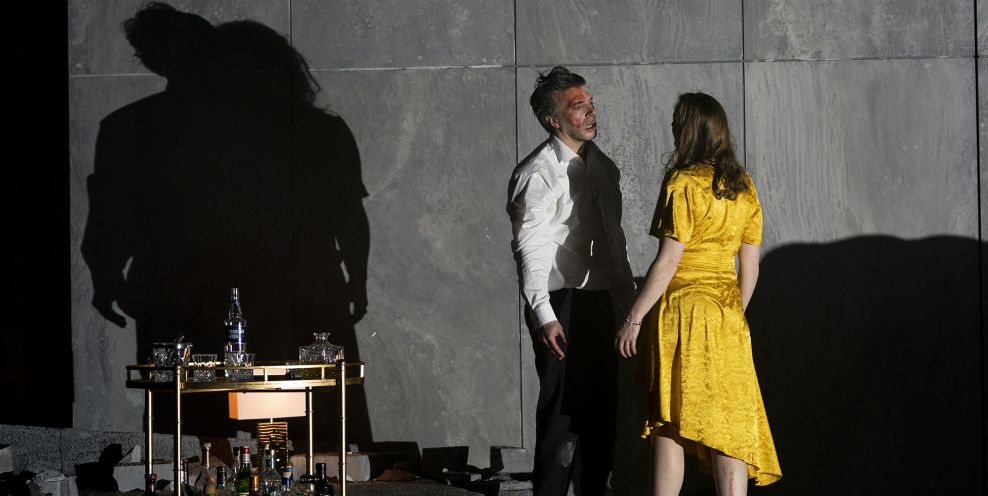
The apocalyptic and domestic collide in Enda Walsh’s riveting production of Bluebeard’s Castle. A century on from its inception, Bartók’s fabulist opera on obsession, monstrosity and womanhood still retains the power to cause wonder, shock audiences, and embody the dark mystery of the man.
Watching this performance is a multi-linear experience – as per any Anglocentric opera, the audience’s focus is drawn both to the stage and the surtitles. A reading of imagistically-charged poetry (derived from the Hungarian libretto, the work of 10 translators) becomes entwined with dramatic action. So too do the projections, the work of Jack Phelan, which flicker and illuminate the pale-grey wall behind Judith and Bluebeard. The contents of the seven rooms are displayed here – the back of the character’s corneas become represented on film. This is where unspeakable horrors are made visible.
Only an hour-long, for opera Bluebeard’s Castle is a terse work. Judith has followed the infamous Bluebeard back to his castle – out of a twisted and perverse sense of love, and she wishes to see into seven different rooms inside his ruinous abode, each of which contains a different horror. Bluebeard insists she stop, but Judith persists, and so together they descend into the psychological landscape of his vicious past.
In the character dynamics, we see a curious shift of expectations. Judith is the instigator of the descent, a self-narrator who roots herself in ambitions of desire, while Bluebeard languishes in the guilt of his past actions (at one stage, he curls up in ashen dirt, singing the refrain of “Tears”, “Tears…”). Bluebeard is a vulnerable monster here but a monster nonetheless. The tragedy present is his potential for change, and perhaps the wish for such a change – but ultimately, for whatever dark reasoning of his demented psyche, this seeming sentiment becomes a cynical ploy to trap Judith in a terrible fate akin to that of Bluebeard’s previous wives. Her eagerness and belief in his love add to this tragedy – the muteness of the three former wives, when revealed behind the seventh door, becomes not only a continuum of past women who have fallen to patriarchy’s utility but also Judith’s future.
Character intentions mix and dart between Judith and Bluebeard – stoic and horrified, guilty and desiring – though this plays to the total expressionism of the piece, rather than inconsistency. A slow beginning, where the narrator is painfully patient in the construction of a speaker to amplify his microphone and introduction, did set the evening on an uncertain start, yet overall, Bluebeard’s Castle is a masterwork in multimedia fusion. The frailty of its contemporary resonance to discourses of abuse and male violence merge with the high-modernist underpinnings of its score. Set to its fairytale-esque libretto, this piece becomes an exhilarating evening of theatre.
Correction: 18:44, October 15th, 2018
An earlier version of this article incorrectly spelled Enda Walsh’s name.






